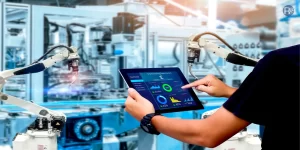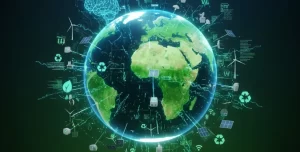
Top 10 Ways AI is Transforming Technology and Sustainability Practices
Table of Contents
Introduction
Welcome to WikiGlitz! Artificial intelligence (AI) is not only transforming technology but also paving the way for more sustainable practices across various industries.
From optimizing energy consumption to enhancing waste management, AI-driven solutions are crucial for creating a sustainable future. In this guide, we will explore the top 10 ways AI is revolutionizing technology and sustainability practices.
Key Takeaways
- AI enhances efficiency and reduces waste, making technology and sustainability practices more effective.
- The integration of AI in various sectors promotes environmental conservation and resource optimization.
- AI-driven innovations offer scalable solutions to global sustainability challenges.
AI in Renewable Energy Optimization
Improving Efficiency in Solar and Wind Energy Production
AI algorithms analyze weather patterns and optimize the operation of solar panels and wind turbines, maximizing energy production and reducing downtime.
Examples of AI Applications in Renewable Energy
- Google DeepMind and Wind Farms: Google’s AI predicts wind patterns to optimize wind turbine operation, increasing energy output by 20%.
- SolarCity’s Solar Panels: AI optimizes the positioning and performance of solar panels to enhance energy capture.
Smart Grid Management
AI’s Role in Balancing Supply and Demand
AI systems manage the distribution of electricity, ensuring that supply meets demand while minimizing energy waste and enhancing grid reliability.
Enhancing Grid Reliability and Reducing Energy Waste
- Real-time monitoring: AI monitors grid performance and predicts potential failures.
- Demand response: It reduces peak load stress.
Energy Efficiency in Buildings
AI-Driven HVAC Systems
AI optimizes heating, ventilation, and air conditioning systems by learning usage patterns and adjusting settings to maintain comfort while saving energy.
Smart Lighting and Energy Management Systems
AI controls lighting systems based on occupancy and natural light availability, reducing unnecessary energy consumption.
Sustainable Agriculture
Precision Farming and Crop Monitoring
AI-powered sensors and drones monitor crop health, soil quality, and weather conditions, enabling farmers to apply water, fertilizers, and pesticides more efficiently.
Reducing Water and Fertilizer Usage with AI
- AI-driven irrigation: Systems like John Deere’s AI-powered irrigation optimize water usage, reducing waste.
- Soil analysis: AI analyzes soil data to recommend optimal fertilizer application.
Waste Management and Recycling
AI-Powered Sorting Systems
AI systems enhance recycling efficiency by accurately sorting materials, reducing contamination, and improving recycling rates.
Optimizing Waste Collection Routes and Schedules
- Dynamic routing: AI optimizes waste collection routes based on real-time data, reducing fuel consumption and emissions.
- Predictive analytics: AI predicts waste generation patterns, helping municipalities plan effective waste management strategies.
Water Conservation
Smart Irrigation Systems
AI-powered irrigation systems adjust watering schedules based on soil moisture and weather forecasts, conserving water while ensuring healthy crops.
Monitoring Water Quality with AI
AI-driven sensors monitor water quality in real-time, detecting contaminants and ensuring safe water for communities.
Sustainable Transportation
Autonomous Electric Vehicles
AI powers self-driving electric vehicles, reducing emissions and improving transportation efficiency.
Traffic Management and Route Optimization
- AI in traffic control: AI systems analyze traffic patterns and optimize traffic signals, reducing congestion and emissions.
- Route optimization: AI suggests the most efficient routes for drivers, saving time and fuel.
Climate Change Mitigation
AI in Climate Modeling and Prediction
AI analyzes climate data to predict future climate scenarios and assess the impact of various mitigation strategies.
Disaster Response and Management
AI aids in early detection and response to natural disasters, minimizing damage and enhancing recovery efforts.
Sustainable Supply Chain Management
AI in Optimizing Supply Chain Logistics
AI enhances supply chain efficiency by optimizing logistics, reducing transportation emissions, and minimizing waste.
Reducing Waste and Improving Efficiency
- Inventory management: AI predicts demand and manages inventory, reducing overproduction and waste.
- Sustainable sourcing: AI helps companies source materials sustainably, ensuring a lower environmental impact.
Circular Economy Initiatives
AI in Product Lifecycle Management
AI tracks the lifecycle of products, promoting recycling and reusability by identifying when products can be refurbished or repurposed.
Promoting Recycling and Reusability
- Material identification: AI systems identify recyclable materials, enhancing recycling processes.
- Circular supply chains: AI supports the development of circular supply chains, where products are continuously recycled and reused.
Conclusion
WikiGlitz has brought you this comprehensive overview of how AI is transforming technology and sustainability practices.
By integrating AI into various sectors, we can enhance efficiency, reduce waste, and promote sustainable practices. Embrace AI-driven innovations to contribute to a sustainable future and address global environmental challenges effectively.
FAQs
How does AI contribute to sustainability?
AI optimizes resource use, reduces waste, and provides innovative solutions to environmental challenges, promoting sustainability.
How can AI improve energy efficiency in buildings?
AI-driven HVAC systems and smart lighting control adjust settings based on occupancy and natural light, reducing energy consumption.
Want to keep up with our blog?
Our most valuable tips right inside your inbox, once per month.
Error: Contact form not found.
WikiGlitz Team
Welcome to WikiGlitz, your ultimate destination for tech insights and innovation. Our expert team is dedicated to delivering free resources and professional advice on various technology topics, including Artificial Intelligence, Cyber Security, Cloud Computing, and more. We strive to empower our readers with up-to-date information and practical guidance, ensuring you stay ahead in the rapidly evolving tech landscape. At WikiGlitz, we are passionate about making complex technology accessible to everyone. Our team of seasoned experts curates content that is both informative and engaging, helping you understand and leverage the latest tech trends. Whether you're a tech enthusiast or a professional, WikiGlitz is your go-to source for reliable, expert-driven content. Join us on this journey to explore and embrace the future of technology.





